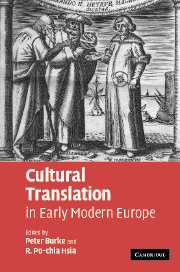Book contents
- Frontmatter
- Contents
- Notes on contributors
- Introduction
- PART I TRANSLATION AND LANGUAGE
- 1 Cultures of translation in early modern Europe
- 2 The Catholic mission and translations in China, 1583–1700
- 3 Language as a means of transfer of cultural values
- 4 Translations into Latin in early modern Europe
- PART II TRANSLATION AND CULTURE
- PART III TRANSLATION AND SCIENCE
- Bibliography
- Index
3 - Language as a means of transfer of cultural values
Published online by Cambridge University Press: 27 July 2009
- Frontmatter
- Contents
- Notes on contributors
- Introduction
- PART I TRANSLATION AND LANGUAGE
- 1 Cultures of translation in early modern Europe
- 2 The Catholic mission and translations in China, 1583–1700
- 3 Language as a means of transfer of cultural values
- 4 Translations into Latin in early modern Europe
- PART II TRANSLATION AND CULTURE
- PART III TRANSLATION AND SCIENCE
- Bibliography
- Index
Summary
As was suggested in chapter 1, from the point of view of a cultural historian what is not translated into a given language may be as significant and as revealing as what is translated. In the case of the Slovaks in the early modern period, the significant absences include the most translated text of all, the Bible. Why this was the case will be explained in the course of the chapter.
The use of the vernacular in the liturgy and especially its use as a means of access to divine revelation – the Bible – was a basic characteristic of Protestantism from the time of the Reformation onwards. However, a vivid discussion about the accessibility of the Bible as a source of true faith has already taken place in the Middle Ages, in which English and German authors were the first to take part. There was serious anxiety about the laity or ignorant priests reading the Scripture, while it was feared that vernacular translations could change the meaning of the text, by using inappropriate metaphors, for instance.
The English and the German translations of the Bible were not the only ones to be widely discussed. Bohemia was another important centre of these discussions, from Jan Hus onwards. Despite this, the neighbouring region of Hungary, including modern Slovakia, accepted the Devotio moderna movement rather than the teaching of Hus himself. In the Kingdom of Hungary, the social consequences of the activities of Hus were mainly negative.
- Type
- Chapter
- Information
- Cultural Translation in Early Modern Europe , pp. 52 - 64Publisher: Cambridge University PressPrint publication year: 2007
- 1
- Cited by



